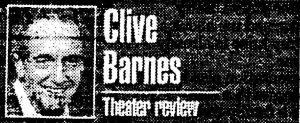New York Post
Monday, September 9, 1996
ONE MAN SHOW IS A PERFECT PITCH!

There is one fearsome, compelling moment in Eddie Frierson’s one-man show, “MATTY: AN EVENING WITH CHRISTY MATHEWSON,” directed by Kerrigan Mahan, now at the Lambs Theatre.
Frierson has himself written the script, based on the life, sayings and writings of the man who was arguably America’s first major baseball legend, and in 1936, 20 years after his retirement as a player and nine years after his death, one of the originals inducted into the Inaugural Class of Baseball’s Hall of Fame.
The Frierson/Mathewson moment has, however, nothing particularly to do with either Mathewson’s formidable achievements or even his obviously extraordinarily engaging personality.
The moment is, virtually, at the end of the quite long yet blissfully painless evening, and the somewhat garrulous, yet always interesting and charming, chat is about to wind down. The Big Six’s (as Mathewson was popularly referred to) career was over, and he was clearly about to die, at the comparatively young age of 45, of tuberculosis, probably acquired from exposure to poison gas during his service in World War I.
But just as we are getting ready to shuffle out of the theatre — hopefully amused by all the baseball reminiscence and lore — unexpectedly the houselights go up. Startlingly, Frierson/Mathewson looks out at the audience, grins and invites questions.
Instantly a one-man show becomes a living lecture from a dead man — it is as if we had been able to ask Emlyn Williams/Charles Dickens how he proposed to end “Edwin Drood”!
The audience jumps at the opportunity — treating Frierson exactly as if he were Mathewson reborn. How did he invent the “screwball” — he called it the “fade-away” — or what did he think of Shoeless Joe Jackson and the Black Sox Scandal?
And Frierson is totally convincing — not only giving, say, a beautifully technical account of the “fade-away,” but in behaving seemingly with all the authority and knowledge of Mathewson’s acquired personal history. It’s pure virtuosity.
As for the show as a totality, this is a lively visit with a fascinating man, full of anecdotage, the absolute value of which might depend on your appetite for baseball mythology. I myself enjoyed the show very much, but I am certain that my son — a baseball fanatic — would have enjoyed it even more.
But he — lost in all the stories and glimpses of legends past — might have missed the full thrilling impact of that startling theatrical moment when illusion becomes reality, and the actor totally takes over the persona of the acted.
Theatre Review by Clive Barnes, NEW YORK POST

Follow MATTY on Social Media!